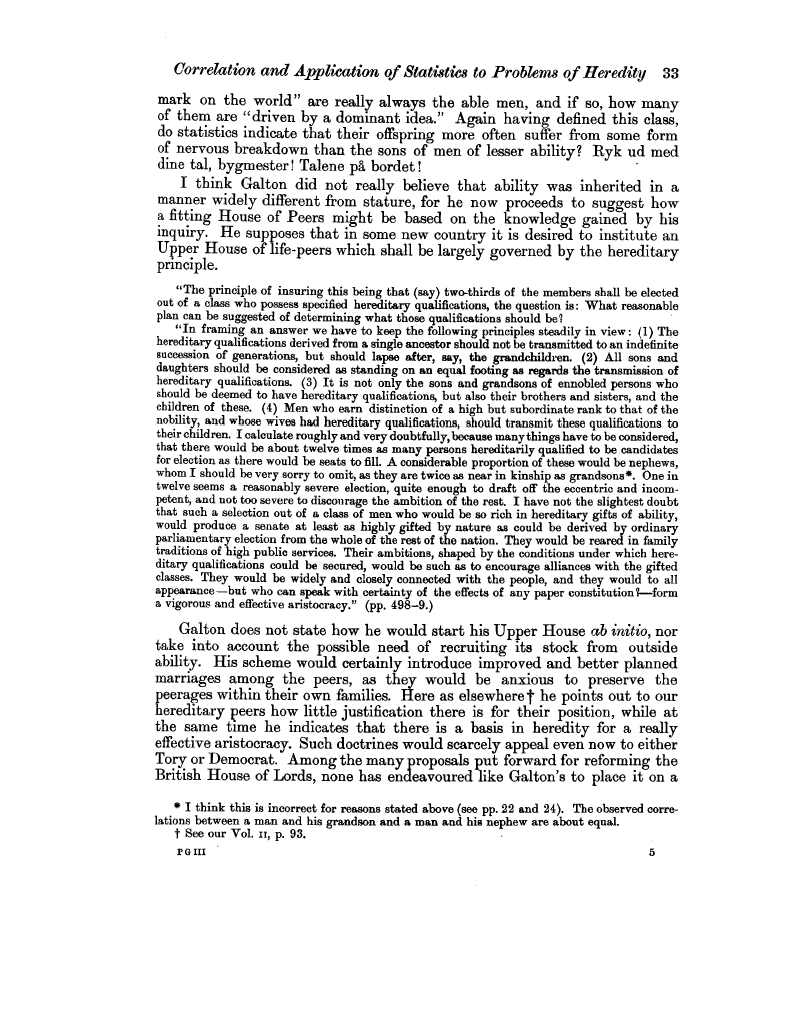| ||||||

OCR Rendition - approximate
dine tal, bygmester! Talene pa bordet! I think Galton did not really believe that ability was inherited in a manner widely different from stature, for he now proceeds to suggest how a fitting House of Peers might be based on the knowledge gained by his inquiry. He supposes that in some new country it is desired to institute an Upper House of life-peers which shall be largely governed by the hereditary principle. "The principle of insuring this being that (say) two-thirds of the members shall be elected out of a class who possess specified hereditary qualifications, the question is: What reasonable plan can be suggested of determining what those qualifications should be? "In framing an answer we have to keep the following principles steadily in view: (1) The hereditary qualifications derived from a single ancestor should not be transmitted to an indefinite succession of generations, but should lapse after, say, the grandchildren. (2) All sons and daughters should be considered as standing on an equal footing as regards the transmission of hereditary qualifications. (3) It is not only the sons and grandsons of ennobled persons who should be deemed to have hereditary qualifications, but also their brothers and sisters, and the children of these. (4) Men who earn distinction of a high but subordinate rank to that of the nobility, and whose wives had hereditary qualifications, should transmit these qualifications to their children. I calculate roughly and very doubtfully, because many things have to be considered, that there would be about twelve times as many persons hereditarily qualified to be. candidates for election as there would be seats to fill. A considerable proportion of these would be nephews, whom I should be very sorry to omit, as they are twice as near in kinship as grandsons*. One in twelve seems a reasonably severe election, quite enough to draft off the eccentric and incompetent, and not too severe to discourage the ambition of the rest. I have not the slightest doubt that such a selection out of a class of men who would be so rich in hereditary gifts of ability, would produce a senate at least as highly gifted by nature as could be derived by ordinary parliamentary election from the whole of the rest of the nation. They would be reared in family traditions of high public services. Their ambitions, shaped by the conditions under which hereditary qualifications could be secured, would be such as to encourage alliances with the gifted classes. They would be widely and closely connected with the people, and they would to all appearance-but who can speak with certainty of the effects of any paper constitution?-form a vigorous and effective aristocracy." (pp. 498-9.) Galton does not state how he would start his Upper House ab initio, nor take into account the possible need of recruiting its stock from outside ability. His scheme would certainly introduce improved and better planned marriages among the peers, as they would be anxious to preserve the peerages within their own families. Here as elsewhere t he points out to our hereditary peers how little justification there is for their position, while at the same time he indicates that there is a basis in heredity for a really effective aristocracy. Such doctrines would scarcely appeal even now to either Tory or Democrat. Among the many proposals put forward for reforming the British House of Lords, none has endeavoured like Galton's to place it on a * I think this is incorrect for reasons stated above (see pp. 22 and 24). The observed correlations between a man and his grandson and a man and his nephew are about equal. f See our Vol. II, p. 93. P G III 5 Correlation and Application of Statistics to Problems of Heredity 33 mark on the world" are really always the able men, and if so, how many of them are "driven by a dominant idea." Again having defined this class, do statistics indicate that their offspring more often suffer from some form of nervous breakdown than the sons of men of lesser ability? Ryk ud med
|